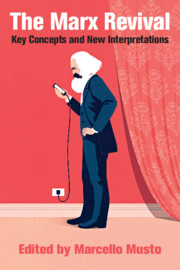Book contents
- The Marx Revival
- The Marx Revival
- Copyright page
- Contents
- About the Editor
- Contributors
- Preface
- Acknowledgements
- Note on the Text
- 1 Capitalism
- 2 Communism
- 3 Democracy
- 4 Proletariat
- 5 Class Struggle
- 6 Political Organization
- 7 Revolution
- 8 Work
- 9 Capital and Temporality
- 10 Ecology
- 11 Gender Equality
- 12 Nationalism and Ethnicity
- 13 Migration
- 14 Colonialism
- 15 State
- 16 Globalization
- 17 War and International Relations
- 18 Religion
- 19 Education
- 20 Art
- 21 Technology and Science
- 22 Marxisms
- Index
- References
6 - Political Organization
Published online by Cambridge University Press: 29 May 2020
- The Marx Revival
- The Marx Revival
- Copyright page
- Contents
- About the Editor
- Contributors
- Preface
- Acknowledgements
- Note on the Text
- 1 Capitalism
- 2 Communism
- 3 Democracy
- 4 Proletariat
- 5 Class Struggle
- 6 Political Organization
- 7 Revolution
- 8 Work
- 9 Capital and Temporality
- 10 Ecology
- 11 Gender Equality
- 12 Nationalism and Ethnicity
- 13 Migration
- 14 Colonialism
- 15 State
- 16 Globalization
- 17 War and International Relations
- 18 Religion
- 19 Education
- 20 Art
- 21 Technology and Science
- 22 Marxisms
- Index
- References
Summary
To be sure, these early writings refer to the party in a broad sense – as an organized embodiment of ideas – rather than an instrument for securing state power. Nevertheless, they serve as the basis of the concept of organization that he developed for the rest of his life. Political parties for Marx were about much more than the exercise of power or domination. They are forms for intervening in reality on the basis of ideas that have proven their historical objectivity. For this reason, he often referred to ‘the party’ even when it consisted of no more than he and Friedrich Engels.
- Type
- Chapter
- Information
- The Marx RevivalKey Concepts and New Critical Interpretations, pp. 108 - 125Publisher: Cambridge University PressPrint publication year: 2020

